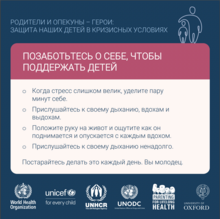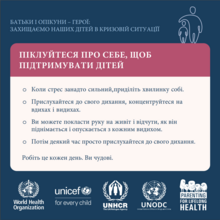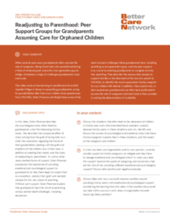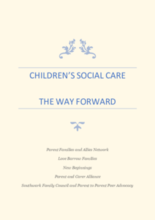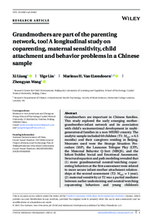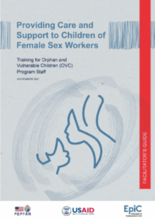Displaying 31 - 40 of 909
Реагируя на кризис в Украине, эксперты по воспитанию детей Оксфордского университета вместе со своими международными коллегами подготовили это простое в использовании руководство для семей и других организаций по поддержке детей в нынешней чрезвычайной ситуации. Руководство основано на доказательных исследованиях.
Реагуючи на кризу в Україні, експерти Оксфордського університету з питань батьківства разом зі своїми міжнародними колегами підготували цей простий у використанні посібник для сімей та інших організацій щодо підтримки дітей у нинішній надзвичайній ситуації. Посібник заснований на доказових дослідженнях.
There are limited studies which investigate the perceived needs and wellbeing of parents caring for their children with disability from culturally and linguistically diverse communities. This qualitative study uniquely explored the experiences and cultural factors of Vietnamese parents caring for children with a disability in multicultural Australia.
This video summary accompanies the Readjusting to Parenthood: Peer Support Groups for Grandparents Assuming Care for Orphaned Children (Upendo Village, Kenya) practitioner learning video which is part of the Kenya Practitioner Learning Video Series.
“Engaging Fathers – Putting Lessons Into Practice” is a three-part series to share strategies implemented from three of the five State or county agencies: Los Angeles County, California; Hartford, Connecticut; and Prowers County, Colorado.
This report is based on consultations with parents and allies in England carried out by Parent Families and Allies Network; Love Barrow Families; New Beginnings; Parent and Carer Alliance; and Southwark Family Council and Parent to Parent Peer Advocacy. It sets out ideas on making the care system more supportive, humane and inclusive, and ensuring families’ needs are met early, with advocacy as a core feature. It also argues for immediate changes, led by parents and children with lived experience of social care.
“Engaging Fathers – Putting Lessons Into Practice” is a three-part series to share strategies implemented from three of the five State or county agencies: Los Angeles county, California; Hartford, Connecticut; and Prowers county, Colorado. Part one focuses on the strategies developed within Hartford, Connecticut.
When parents pass away, grandparents often assume the role of caregivers. Being thrust back into parenthood during a time of immense grief, and with a two-generation gap to bridge, introduces a range of challenges grandparents must overcome. This video look at the learning of practitioners from Upendo Village in Kenya in supporting grandparents caring for grandchildren after their own children have passed away from HIV/AIDs.
Grandmothers are important in Chinese families. This study explored the early emerging mother-grandmother-infant network and its association with a child's socioemotional development in multigenerational families in a non-WEIRD country.
This resource aims to improve the quality of care for children of female sex workers (CFSWs). It is a training guide that aims to strengthen the capacity of community workers and volunteers to provide services that meet the special needs of CFSWs and ensure these services are key population-competent, child-friendly and stigma-free.

